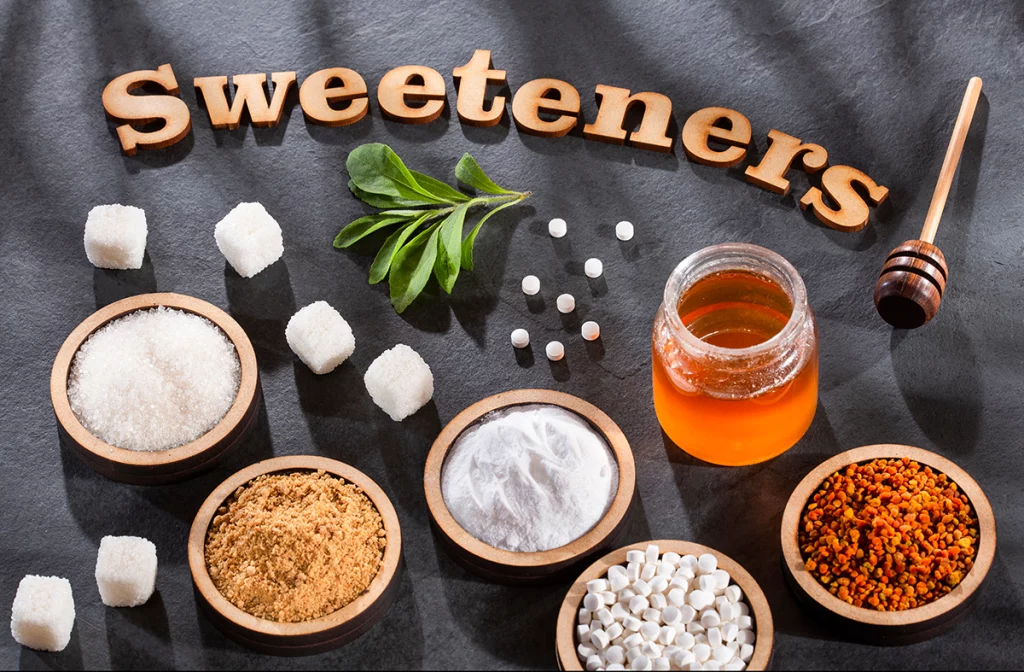
For centuries, honey and sugar have been used to sweeten food and beverages. Today, a range of sweeteners has been developed to provide low-calorie alternatives to sugar. Some of the sweeteners, often called “intense sweeteners,” provide an intense sweet taste with little or no calories. Rules for the use of sweeteners are laid down in several countries’ regulations on food and additives, such as in the European Commission’s regulation on food additives.
Natural sweeteners are extracted from plant sources (e.g., stevia) or produced by animals (e.g., honey), whereas artificial sweeteners are manufactured through industrial processing. The rising awareness of the need for nutritious and well-being food items among consumers acts as a driving force for the growth of the sweeteners industry.
In view of the increasing interest of consumers in sweetener consumption, global sweetener manufacturers have been witnessing robust year-on-year growth for the past few years, owing to the rising preference for low-sugar food products, coupled with an extensive application range of sweeteners. The global sweeteners market size was valued at USD 94.48 billion in 2021 and is expected to expand at a compound annual growth rate (CAGR) of 6.4 per cent from 2022 to 2030. The high growth rate is being propelled by the fast-paced lifestyle and the increasing preference for convenience foods.
Furthermore, increased consumption of soft drinks, especially carbonated soft drinks, is expected to drive the demand for sweeteners globally. Due to the soaring occurrence of diabetes and obesity worldwide, the demand for low-calorie sweeteners is increasing, as the majority of health-conscious consumers are choosing products comprising natural sugar substitutes due to lesser side effects compared to artificial sugar substitutes. Diabetes is among the foremost diseases that are on the increase globally. Food nutritionists believe that the major cause of this is excessive usage of sugar, which leads to obesity.
Speaking on this, the chief executive officer of Jola Global Industries Limited, Dr. Moses Omojola, explained that natural sugar substitutes do not contain carbohydrates and therefore generally do not raise blood sugar levels. The use of low-calorie sweeteners is consequently being encouraged by governments across the globe due to the health benefits.
The chartered chemist explained that sweeteners such as polyol and high-intensity sweeteners are also being widely used due to their sweet taste and tooth-friendliness. Among other pro-health benefits of sweeteners such as xylitol and mannitol are a reduction in brain swelling and acute kidney failure.
“They act as osmotic diuretics and help remove excess water from the body. Furthermore, they are being used in sugar-free medicinal syrups, tablets, and capsules on account of their binding, sweetening, taste masking, and coating properties. From a scientific point of view, evidence on sweeteners and health effects in people indicates that sweeteners improve cardiometabolic risk factors,” he said.
The expert added that the demand for sweeteners in Nigeria is projected to reach 2.15 million metric tons by 2026, up from 2.11 million metric tonnes in 2021. According to him, this represents an average growth rate of 0.3 per cent each year since 2017. During the same period, available statistics show that the production capacity of sweeteners in Nigeria will only rise to a meagre 53,000 metric tonnes by 2026, from 45,000 metric tonnes produced in 2021.
“This represents an average growth rate of 2.7 per cent annually since 2017. Thus, there is a need for a gregarious development of the sector in the country to reduce the cost of importation and for the country to benefit from the increased revenue generated from the sales of sweeteners globally. For instance, the revenue in the sweeteners segment amounts to US$169.50bn in 2023. The market is expected to grow annually by 7.37 per cent (CAGR 2023-2027). Presently, the highest revenue of US$112,100.00 m was generated in China in 2022,” he added.

Speaking in an exclusive chat with Science Nigeria, the director-general of the Raw Materials Research and Development Council (RMRDC), Prof. Hussaini Ibrahim said, in order to increase revenue generation locally from this sector, the council has been working to promote the commercial production of natural sweeteners from Stevia raubadiana, Thaumatococcus daniellii, sugar beet, sweet sorghum and cassava in Nigeria. According to him, sweet sorghum, a multipurpose plant, has been developed for the production of glucose syrup by the council.
“Nigeria requires an estimated 90,000 metric tons of glucose syrup annually for use in the food, soft drink, confectionery, and pharmaceutical industries. However, only about 20% of this is being sourced locally. The juice from the stalk can be used for sugar syrup or bio-alcohol, its grains for human consumption, and its stover and bagasse for animal consumption.
“In addition, sweet sorghum has a higher ethanol yield per hectare and better resistance to adverse climatic or environmental conditions than similar crops. Depending on the condition, the yield per hectare of sweet sorghum grains and stalks is 3–7 tonnes and 54–69 tonnes, respectively. Sweet sorghum is a plant with a C4 photosynthesis pathway. Therefore, its photosynthetic rate and dry matter production per unit of inputs are more than those of other sugar-producing crops like sugar cane. The Council is collaborating with the Sanglian Technology Development Centre (STDC) in China, which has developed sweet sorghum varieties with good qualities such as a short duration of between 80-133 days maturity period and biomass yield of about 96MT/Ha and sugar content of 19-28 per cent brix (amount of dissolved sugar in a solution),” he said.
He added that among the initiatives undertaken by RMRDC under this direction include the development and patenting of three (3) different varieties in collaboration with the Institute of Agricultural Research (IAR), ABU Zaria. Two of the varieties have been released to farmers by the National Committee on variety release.
Ibrahim shared that the council has made significant strides in the development and promotion of various sweeteners in Nigeria. He highlighted several key initiatives:
Sweet Sorghum. RMRDC has designed, developed, fabricated, and patented equipment for processing sweet sorghum into glucose syrup, ethanol, and animal feed. Sweet sorghum has shown potential as a versatile crop with high ethanol yield and resistance to adverse environmental conditions. The Council is collaborating with partners to promote its commercial production and utilisation.
Sugar Beet. Field trials of sugar beet have been conducted in Plateau, Niger, Nasarawa states and the Federal Capital Territory (FCT). The trials demonstrated that sugar beet can grow effectively in Nigeria. The Council is partnering with the Niger State government and PASUA USA Agro Limited to develop the sugar beet value chain in the country, aiming to establish sugar beet as an alternative raw material source for the sugar industry.
Stevia. RMRDC has collaborated with Kong Associates in Shanghai, China, to promote the development of Stevia in Nigeria. Improved Stevia varieties imported from Ghana have undergone multi-locational trials in different ecological zones of Nigeria. Stevia is a natural sweetener with zero calories and is 300 times sweeter than sugar. The Council aims to promote the commercial cultivation and processing of Stevia for sweetener production.
Sorbitol from Cassava. RMRDC has developed a 75 kg/batch sorbitol production pilot plant using cassava as the primary raw material. Nigeria, being one of the highest producers of cassava globally, can utilize cassava to produce sorbitol—a sugar polyhydroxy alcohol with lower caloric values and natural sweetening properties. The pilot plant has been installed at the RMRDC Technology and Innovation Complex.
Thaumatin from Thaumatococcus daniellii. RMRDC has extracted thaumatin, a non-toxic and intensely sweet protein, from locally grown Thaumatococcus daniellii. Thaumatin is significantly sweeter than sucrose and is used as a natural sweetener and flavour enhancer by the food and confectionery industries. The Council has collaborated with Pharma Deko Nig. Plc. for the processing of natural sweeteners from T. daniellii for the production of non-caloric drinks and pharmaceutical products.
RMRDC is actively mobilising investors and farmers to engage in commercial production of these plant species, aiming to establish Nigeria as a major sweetener producer in West Africa and the continent. The initiatives have the potential to create jobs, generate wealth, reduce poverty, and contribute to a healthier population.
Ibrahim called on Interested investors to visit the RMRDC website or offices across the country for more information on these projects.


